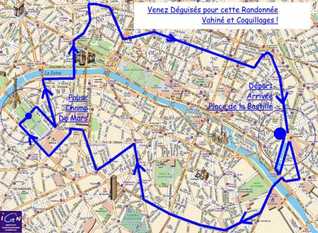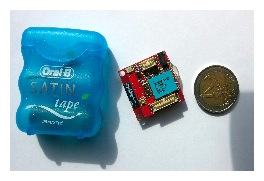Motivations
Every Friday evening and every Sunday afternoon in Paris, weather permitting, groups of between 5,000 and 15,000 people go
rollerblading. Over the course of three hours, the rollerbladers typically cover 30 km, crossing a large portion of
the city. They are guided by staff members and assisted by public safety forces.
In order to analyze the mobility of participants, we perform experiments in which we deploy sensors, called iMotes, on approximately a hundred volunteers,
who could be organisers' friends, members of rollerblading associations or members of staff. These sensors are on loan from Intel Research Cambridge, in the UK.
In addition to this sensor deployment, we ask other people to activate Bluetooth on their mobile phones.
The iMotes also use Bluetooth technology and log at a high frequency the devices (other iMotes or people's mobile phones) they meet.
The data that we collect allows us to measure and characterize the interactions between people over the duration of the roller tours.
Such information is helpful in the design of new forms of applications in the domains of emergency response, location services, and content delivery.
These applications will be available on mobile phones and will take advantage of the ability of phones to communicate directly to other
phones in their vicinity, without passing through the traditional cell phone network.
 Sample tour
Sample tour
Deployment plan
During an outing, staff members are
organized into groups. Over the duration of an outing these groups have an almost static position relative to
each other: there are four groups on each side of the crowd, one group at the front, another one at the end, and two
groups within the crowd itself. We will entrust iMotes to each group. Deploying in this manner should distribute
coverage across the crowd, though we expect that the wireless network will not be fully connected all of the time
(indeed, we are interested in studying the disruptions that emerge from changing network conditions for devices of
limited range). The remaining iMotes are entrusted to others within the crowd, many of whom do not have assigned positions.
 Sensors (Intel iMote)
Sensors (Intel iMote)
Privacy issues
Volunteers holding iMotes are made aware of the privacy issues related to the experiment: the data that is collected includes
the unique identifier of each radio device, and the times when it comes into radio contact with other devices.
This data might be associated with descriptive information concerning the individual who bears the device (whether she or
he is a staff member or a regular participant, for instance), however the trace data will be stored separately from the
names of the participants, and RollerMotes forswears any attempt to associate a trace with a person?s name.
Regarding regular participants participants who are asked to turn on their Bluetooth devices, we ensure that data are anonymised
after the experiment.


